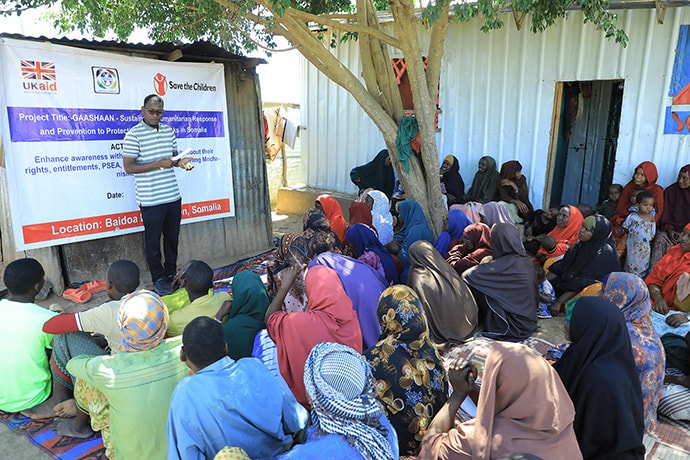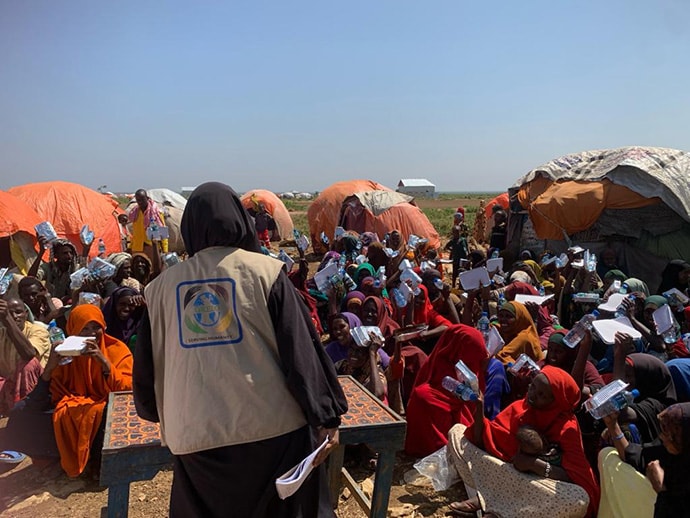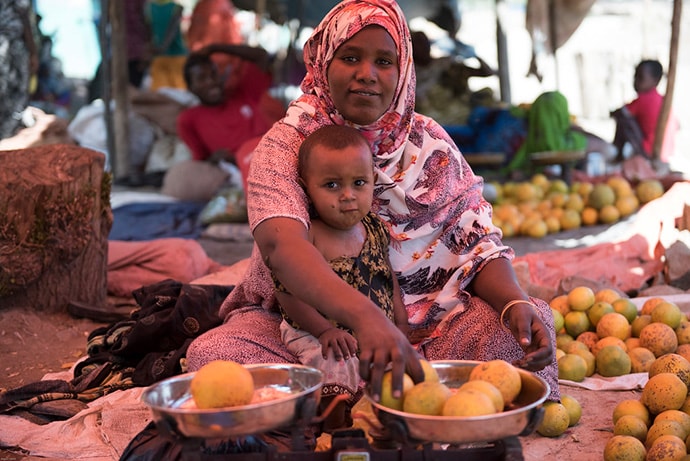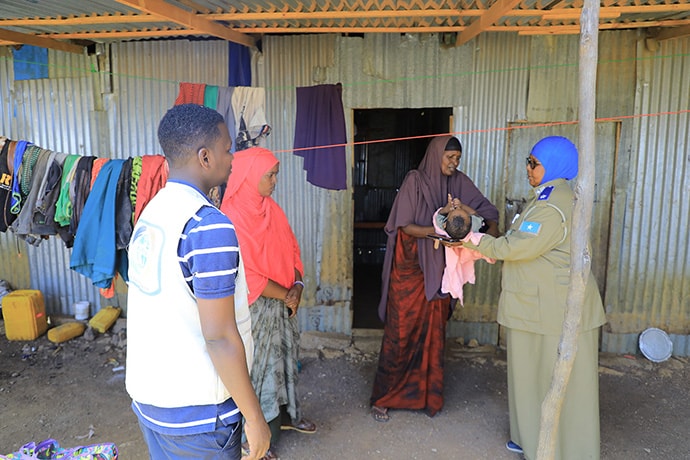By Abdiweli Shariff Ali, GBV and Protection Project Coordinator, Gargaar Relief and Development Organization (GREDO)

Abdullahi Abukar, Senior Protection Officer, conducting Awareness campaign about rights, prevention of sexual exploitation, and how to report incidents. Photo: GREDO
Somalis are one of the tremendous patriarchal societies in horn of African, where men control the power unconditionally and women has no gentle space of participation and decision-making roles except the roles as providers of basic needs and childcaring and nurturing children, and experience sexual gender base violence (GBV) and discrimination.
Somali culture is prearranged according to a clan structure with membership in a Diya group based on kinship. A Diya-paying group is made up of between a few hundred to a few thousand men linked by lineage and a contractual agreement to support one another, especially in regard to compensation for injuries and death against fellow members. Women are not counted as paying members in the same way as men and payments go directly to men.
Every day, in every part of Somalia, women are confronted by discrimination and inequality. They face violence, physical abuse, verbal abuse and unequal treatment, denial of resources, opportunities, and right participation in their wider communities, and are denied opportunities to learn, to earn and to lead. Women form the majority of those living in poverty.
In most households there are many bindings on girls and excessive freedom for boys whereas boys do not participate in domestic duties and girls have compulsion for the same. In Somali girls face problems like teasing and molestation. This creates insecurity in the minds of girls.

Naima, Protection & Safeguarding Officer conducting awareness to support women and girls’ rights organizations to sensitize communities on positive attitudes towards GBV survivors and unaccompanied children. Photo: GREDO
GREDO has strengthened the capacities of all community-based civil society organizations and among these are human rights and women rights defenders involved in rebuilding the State of Somalia – the cornerstone of lasting and meaningful social change. Addressing patriarchal barriers requires an in-depth understanding of gender inequalities and their implications in all spheres of life. It requires the inclusion of all people involved in their manner in the rebuilding of the state of Somalia: Ministries, governmental organizations, local organizations, CSOs, religious leaders, academia, think tanks, media and journalists, Somali women, men, girls, and boys, but also international donors, humanitarians, and NGOs.
Advancing the gender work by strengthening capacities can only be done in collaboration with those most affected, the rights holders, while also engaging with duty bearers.
There is a Somali saying that “while a man is the head of the household, a Somali woman is the neck that helps direct the position of the head.” This describes how women (particularly older women) have significant influence in their home life. Somali women are renowned for being entrepreneurs and businesspeople.

Somali businesswoman at market. Photo: ©UNICEF/Michael Tsegaye
As a national humanitarian and development organization in Somalia, Gargaar Relief and Development Organization (GREDO) would like to, on the instance of gender equality and International Women’s Day 2024, amalgamate with women in challenging any violence related to gender base violence, discrimination, bias, and stereotypes. We go all-out to help create a community that is diverse, equitable, and inclusive in the world.
In our obligation to further gender equality, we have shouldered numerous measures to help break the gender base violence, discrimination, bias, and stereotypes that culture has had on women for numerous years on dissimilar fronts. These measures include the development of a gender-sensitive policy which makes a comfortable ground to women, stretching from recruitment with affirmative action, to providing comfortable maternity leave and childcare breastfeeding hours during working hours.
GREDO also provides various possibilities for women to be empowered in leadership roles, ranging from officers, coordinators, and managers to senior director roles. Our senior leadership team comprises 20% women, and 10% of our higher-grade positions are filled with women professionals. Across our programmes, the organization respects and affirms women’s, men’s, girl’s, and boy’s equal worth, dignity, and rights, as well as the critical role that each group plays in achieving long-term transformational development and women empowerments.
In GREDO’s agenda, gender equality and women’s empowerment are commonly recognized as core development goals that are essential for the realization of human rights and the achievement of effective development. Women and men must have equal authority and resources to design their own lives and contribute to their families and communities if sustainable progress is to be achieved.

Abdullahi Abukar Senior Protection Officer handing over Mustafa a 2.5 year old neglected and abandoned child to Mama Udugow Adan, one of GREDO’s foster carers. Photo: GREDO
Without addressing the basic challenges of gender equality, it is impossible to establish long-term child well-being. In our policies, we have outlined our commitment to gender equality as a critical part of the organization’s vision and mission for life in all its fullness for every child.
Once again, GREDO renews its commitment to open more opportunities to women and calls for the joint hands of all actors to break all forms of bias against women by developing policies that promote a diverse, equitable, and inclusive world.
***
GREDO is an indigenous local NGO. Non-profit, non-partial, non-political and voluntary organization based in Baidoa, Southwest state with an aim of reaching out to the most affected grass-root communities in Bay and Bakool regions, lower Shebelle, Gedo, Galmudug and Banadir region. Responding to the partnership need, a group of Somali intellectuals and well-wishers initiated in December 1992 a local non-governmental organization called Gargaar Relief and Development Organization (GREDO). The organization has implemented during this period different projects including relief and emergency programs and later improved into rehabilitation and developmental programs.